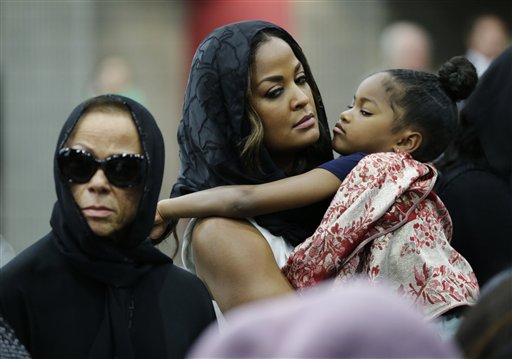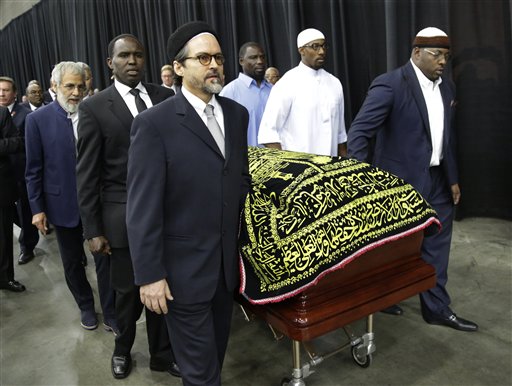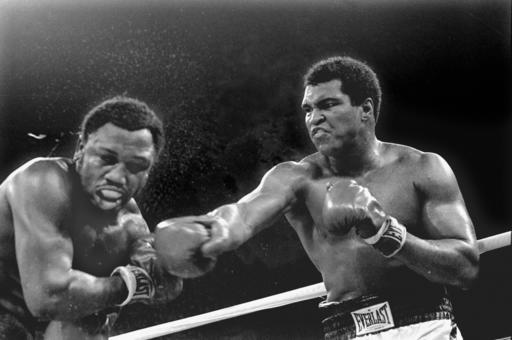Thousands of fans, dignitaries and faithful from across the globe filled a Kentucky arena Thursday to honor Muhammad Ali at a traditional Muslim prayer service where he was remembered as a global icon who used his celebrity to promote unity among faiths, races and nations.
CCTV America’s Sean Callebs reports.
Follow Sean Callebs on Twitter @seancctv

The service, known as Jenazah, began two days of remembrances for the boxing legend, who died Friday at age 74. Ali designed his final memorials himself years before he died, and intended them to be in his hometown of Louisville, Kentucky, and open to all.
“He was a gift to his people, his religion, his country, and ultimately, to the world. Ali was an unapologetic fighter for the cause of black people in America,” said Sherman Jackson, a leading Muslim scholar who spoke at the service. “Ali was the people’s champion, and champion he did the cause of his people.”
More than 14,000 got tickets for the Thursday service, and millions more were able to watch by live stream. Tickets for Friday’s memorial were gone within an hour. Civil rights activist Jesse Jackson, boxing promoter Don King and Louis Farrakhan, head of the Nation of Islam, were among the high-profile guests in attendance Thursday.

Muhammad Ali’s wife Lonnie and her daughter Laila attend Muhammad Ali’s Jenazah, a traditional Islamic Muslim service, in Freedom Hall, Thursday, June 9, 2016, in Louisville, Ky. Laila is holding her daughter Sydney Jurldine Conway. (AP Photo/David Goldman)
Ali joined the Nation of Islam, the black separatist religious movement, in the 1960s, but left after a decade to embrace mainstream Islam, which emphasizes an embrace of all races and ethnicities.
The attendees at the service were young and old; black and white; Muslims, Christians and Jews. Some wore traditional Islamic clothing, others blue jeans or business suits. Outside the arena, the term “Jenazah” trended on Twitter as the service started and the world began to watch.
“We welcome the Muslims, we welcome the members of other faith communities, we welcome the law enforcement community,” Imam Zaid Shakir, a prominent U.S. Muslim scholar, told the crowd. “We welcome our sisters, our elders, our youngsters.”
“All were beloved to Muhammad Ali.”
The service lasted less than an hour and included prayers and several speakers, including two Muslim women, who described Ali’s impact on their own lives, on the world’s acceptance of the Islamic faith and as a champion for civil rights.
Mustafa Abdush-Shakur leaned on his cane as he limped into the arena. He came 800 miles from Connecticut despite a recent knee replacement that makes it excruciating to walk.
“This is a physical pain,” he said. “But had I not been able to come and pray for my brother, it would have caused me a spiritual pain and that would have been much deeper.”
A fellow Muslim who shares the boxing great’s name arrived in Kentucky with no hotel reservation, just a belief that his 8,000-mile pilgrimage was important to say goodbye to a person considered a hero of his faith.
Mohammad Ali met the boxer in the early 1970s and they struck up a friendship based on their shared name. The Champ visited his home in 1978 and always joked he was his twin brother, he said. He stood weeping at the funeral, a green Bangladeshi flag draped over his shoulder, holding snapshots he took of the boxer during his visit, one standing with his family, another of him sprawled on a bed in his home.
The service began with four recitations of “Allahu Akbar” or “God is Great,” with silent prayers between of a reading from the first chapter of the Quran, a blessing for Abraham, a general prayer for the well-being and forgiveness of the deceased for the next life and a prayer for everyone at the funeral.
The memorials are taking place after a burst of assaults on U.S. mosques and Muslims following the Islamic extremist attacks last year in Paris and San Bernardino, California, and anti-Muslim rhetoric in the presidential election.
Organizers of Ali’s memorials say the events are not meant to be political. Still, many Muslim leaders say they are glad for the chance to highlight positive aspects of the religion through the example of Ali, one of the most famous people on the planet. The global nature of the service — and because it was streamed — offered a window into a religion many outsiders know little about.
“In this climate we live in today, with Islamophobia being on the rise and a lot of hate-mongering going on, I think it’s amazing that someone of that caliber can unify the country and really show the world what Islam is about,” said 25-year-old Abdul Rafay Basheer, who traveled from Chicago. “I think he was sort of the perfect person to do that.”
Muslims typically bury their dead within 24 hours, but the timeline is not a strict obligation, and accommodations are often made, either to follow local customs or, in the case of a public figure like Ali, provide time for dignitaries and others to travel. Ali died in Arizona and time was needed to transport his body to Louisville, said Timothy Gianotti, an Islamic scholar at the University of Waterloo in Canada.
Gianotti said by phone that he and three others — two Phoenix-area Muslims and Imam Zaid Shakir, a prominent U.S. Muslim scholar who will lead Thursday’s prayers — washed, anointed and wrapped Ali’s body within a day of his death. The body is typically wrapped in three pieces of simple fabric.
“Muhammad planned all of this,” Shakir said. “And he planned for it to be a teaching moment.”
Story by The Associated Press
Zareena Grewal discusses Ali’s funeral
For more on Ali funeral, CCTV America’s Mike Walter spoke to Zareena Grewal, associate Professor of American Studies, Religious Studies, & Middle East Studies at Yale University and the Author of “Islam Is a Foreign Country.”
 CGTN America
CGTN America Muhammad Ali’s casket is escorted by pallbearers for his Jenazah, a traditional Islamic Muslim service, in Freedom Hall, Thursday, June 9, 2016, in Louisville, Ky. (AP Photo/David Goldman)
Muhammad Ali’s casket is escorted by pallbearers for his Jenazah, a traditional Islamic Muslim service, in Freedom Hall, Thursday, June 9, 2016, in Louisville, Ky. (AP Photo/David Goldman)

